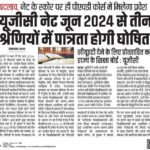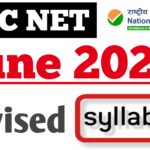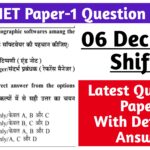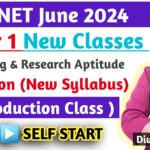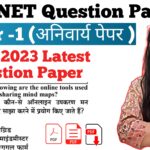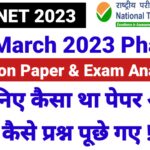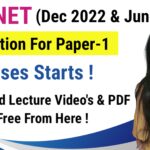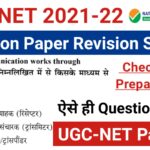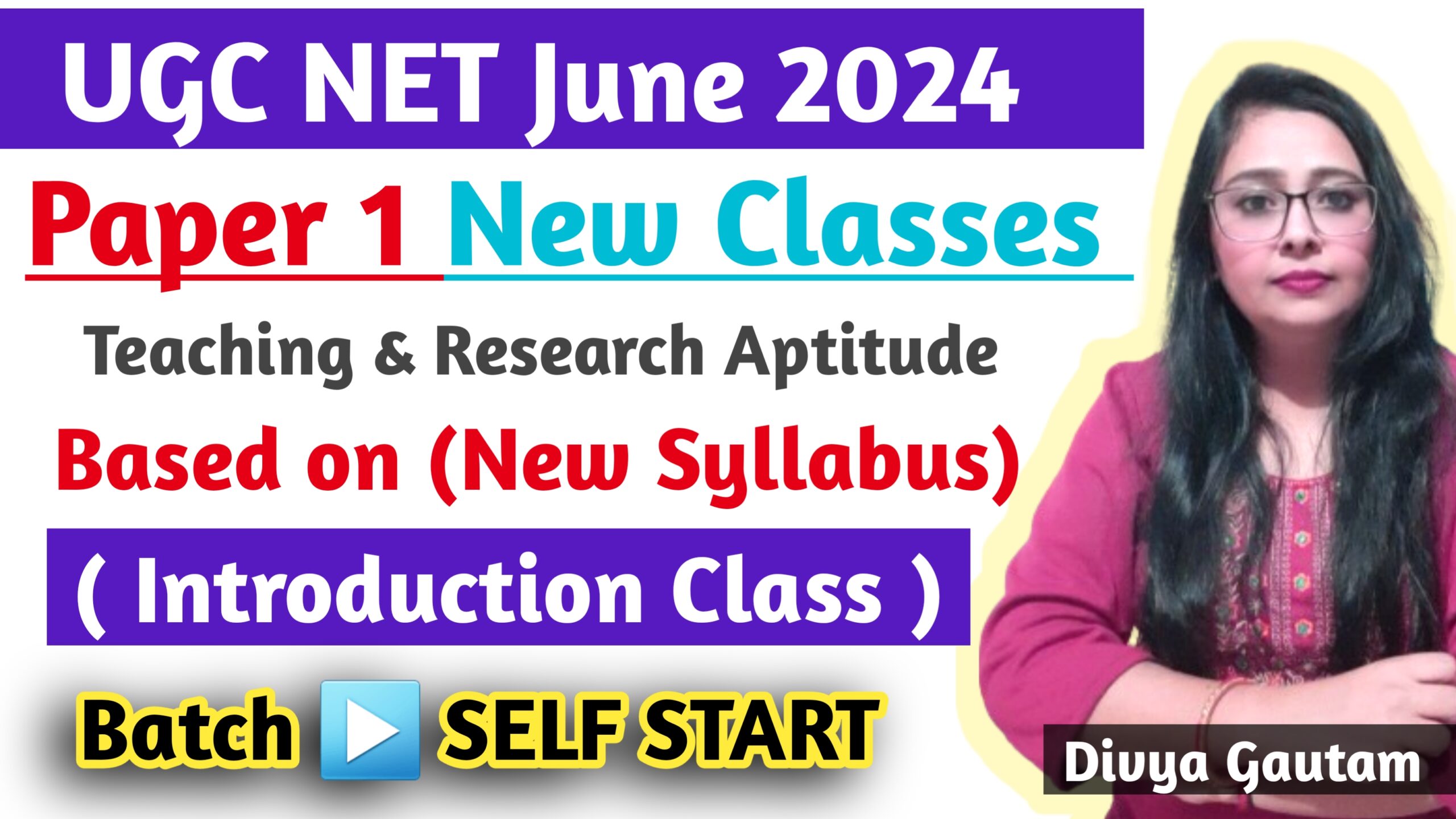
UGC NET June 2024 Paper 1 Classes, Free Notes & PDF : UGC NET Exam is an entry pass for the academic world. The NET qualified individuals are eligible for the post of Assistant Professor at colleges and university level throughout India. Additionally, a NET qualified candidate is also exempted from the entrance test for PhD admission.
UGC NET June 2024 Exam Dates announced earlier –

UGC NET is a National level eligibility examination conducted by the National Testing Agency (NTA) for candidates aspiring to become Assistant Professors in colleges across the country and to also become Junior Research Fellows (JRF). UGC NET June 2024 Paper 1 Candidates aiming to clear the UGC NET must never fail to give their 100% in their preparation.
UGC NET June 2024 Paper 1 stands common for all candidates irrespective of their choice of subject for Paper 2. Candidates find it tiring and time-consuming to find relevant notes for UGC NET Paper 1. In this article, candidates can get the best UGC NET Paper 1 Notes and can also download the same PDFs for free. Paper 1 can be a scoring arena for several candidates, therefore candidates can make use of this opportunity efficiently. In this article,
- Candidates can access effective UGC NET Paper 1 Notes to boost their preparation strategy.
- Candidates can get topic-wise important notes and can also download them for further preparation.
- Candidates can download the UGC NET paper 1 study material PDF for free for further reference.
UGC NET exam is considered one of the toughest exams in India. It is tough, because of the syllabus of UGC NET Exam is very lengthy and vast. For cracking the UGC NET exam, the aspirants should be more dedicated and sincere to achieving the goal.

Ugc Net Dec 2023 Paper 1 Preparation Exam Syllabus & Pattern
UGC NET June 2024 Paper 1 Exam is conducted in online mode (Computer Based Test). The Computer Based Test (CBT) will consist of two papers i.e. Paper-I & Paper-II. There will be no break between Paper-I and Paper-II. Both papers will consist of objective-type, multiple-choice questions. You would see the latest NTA UGC NET Syllabus Paper Paper 1 & 2 in detail. Before attending the exam candidates must check the UGC NET Syllabus and UGC NET New exam pattern PDF.
Note: There are no negative marks for an incorrect response.
Teaching Aptitude
- Teaching: Concept, Objectives, Levels of teaching (Memory, Understanding, and Reflective), Characteristics, and basic requirements.
- Learner’s characteristics: Characteristics of adolescent and adult learners (Academic, Social, Emotional and Cognitive), Individual differences.
- Factors affecting teaching related to Teacher, Learner, Support material, Instructional facilities, Learning environment, and Institution.
- Methods of teaching in Institutions of higher learning: Teacher-centered vs. Learner-centered methods; offline vs. Online methods (Swayam, Swayam Prabha, MOOCs, etc.).
- Teaching Support System: Traditional, Modern, and ICT-based.
- Evaluation Systems: Elements and Types of evaluation, Evaluation in Choice Based Credit System in Higher education, Computer-based testing, Innovations in evaluation systems. Aspirants can refer to the Latest UGC NET strategies so that they can make a proper daily routine for preparing for the exam.
Research Aptitude
- Research: Meaning, Types, and Characteristics, Positivism and Post-positivist approach to research.
- Methods of Research: Experimental, Descriptive, Historical, Qualitative, and Quantitative methods.
- Steps of Research.
- Thesis and Article writing: Format and styles of referencing.
- Application of ICT in research.
- Research ethics.
Comprehension
- A passage of text is given. Questions are asked from the passage to be answered.
Communication
- Communication: Meaning, types, and characteristics of communication.
- Effective communication: Verbal and Non-verbal, Inter-Cultural and group communications, Classroom communication.
- Barriers to effective communication.
- Mass-Media and Society.
Mathematical Reasoning and Aptitude
- Types of reasoning.
- Number series, Letter series, Codes, and Relationships.
- Mathematical Aptitude (Fraction, Time & Distance, Ratio, Proportion and Percentage, Profit and Loss, Interest and Discounting, Averages, etc.).
- Download UGC NET Paper 1 & 2 Syllabus PDF Download (Hindi & English )
Logical Reasoning
- Understanding the structure of arguments: argument forms, the structure of categorical propositions, Mood and Figure, Formal and Informal fallacies, Uses of language, Connotations and denotations of terms, Classical square of opposition.
- Evaluating and distinguishing deductive and inductive reasoning.
- Venn diagram: Simple and multiple uses for establishing the validity of arguments.
- Indian Logic: Means of knowledge.
- Pramanas: Pratyaksha (Perception), Anumana (Inference), Upamana (Comparison), Shabda (Verbal testimony), Arthapatti (Implication), and Anupalabddhi (Non-apprehension).
- Structure and kinds of Anumana (inference), Vyapti (invariable relation), Hetvabhasas (fallacies of inference).
Data Interpretation
- Sources, acquisition, and classification of Data.
- Quantitative and Qualitative Data.
- Graphical representation (Bar-chart, Histograms, Pie-chart, Table-chart, and Line-chart) and mapping of Data.
- Data Interpretation.
- Data and Governance.

Take A Quiz !
- UGC NET Exam Analysis 2nd March 2023
- UGC NET 1 March 2023 Exam Analysis, Question Paper & Answer
- UGC NET 22 February 2023 Paper 1 Question Paper & Exam Analysis
- Education System Of India (Important MCQ )
- MCQ / Quiz ON UNION BUDGET 2023-24
Information and Communication Technology (ICT)
- ICT: General abbreviations and terminology.
- Basics of the Internet, Intranet, E-mail, Audio, and Video-conferencing.
- Digital initiatives in higher education.
- ICT and Governance.
People, Development and Environment
- Development and environment: Millennium development and Sustainable development goals.
- Human and environment interaction: Anthropogenic activities and their impacts on the environment.
- Environmental issues: Local, Regional and Global; Air pollution, Water pollution, Soil pollution, Noise pollution, Waste (solid, liquid, biomedical, hazardous, electronic), Climate change and its Socio-Economic and Political dimensions.
- Impacts of pollutants on human health.
- Natural and energy resources: Solar, Wind, Soil, Hydro, Geothermal, Biomass, Nuclear, and Forests.
- Natural hazards and disasters: Mitigation strategies.
- Environmental Protection Act (1986), National Action Plan on Climate Change, International agreements/efforts -Montreal Protocol, Rio Summit, Convention on Biodiversity, Kyoto Protocol, Paris Agreement, International Solar Alliance. To prepare all these subjects more efficiently, one can also check tips and tricks to crack the UGC NET exam in which we have covered many hacks if to be followed correctly, one can definitely clear the exam.
Higher Education System
- Institutions of higher learning and education in ancient India.
- Evolution of higher learning and research in Post Independence India.
- Oriental, Conventional, and Non-conventional learning programs in India.
- Professional, Technical, and Skill-Based education.
- Value education and environmental education.
- Policies, Governance, and Administration.
We have received a request from many of students asking us to provide all the notes in PDF form so that they can study while they are travelling and offline .So, We have decided to publish all our study notes consolidated at one Page and Easy to download for everyone.
| DI Question | Video |
| DI Question Part 2 | Video |

